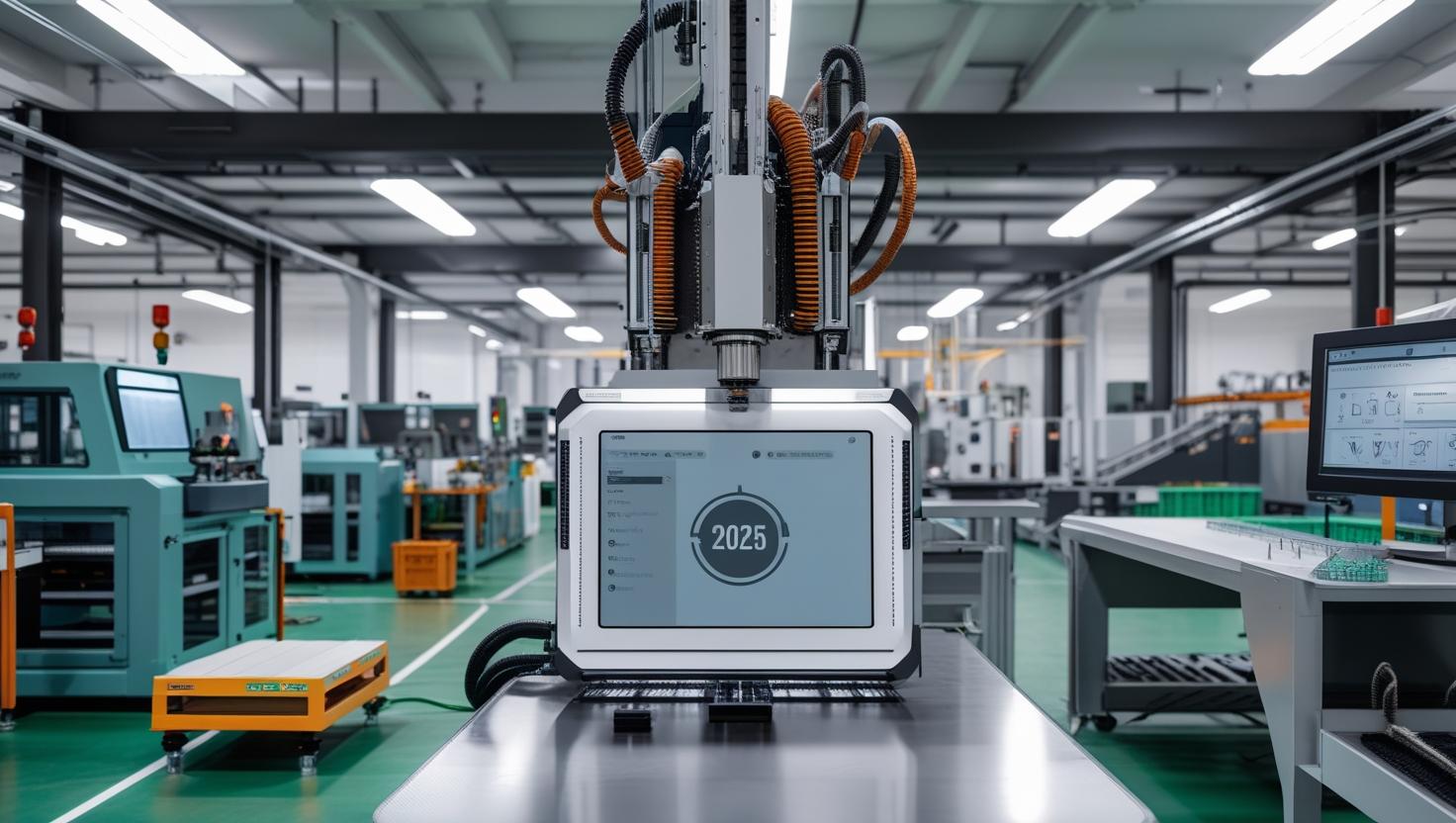Why Custom Manufacturing Software is a Must for Scaling Your Business in 2025

Strong 8k brings an ultra-HD IPTV experience to your living room and your pocket.
The manufacturing industry is evolving rapidly. As we approach 2025, manufacturers face an increasing need to adapt to new challenges such as supply chain disruptions, labor shortages, fluctuating demand, and technological advancements. According to a 2022 report by the National Association of Manufacturers (NAM), over 60% of manufacturers in the U.S. cited operational inefficiency as one of their biggest challenges. To remain competitive and scale successfully, businesses need tools that can provide greater control, efficiency, and customization in their operations. This is where custom manufacturing software development comes into play.
In this article, we will explore why custom manufacturing software is essential for scaling your business and how it can address specific pain points and deliver a competitive edge in 2025 and beyond. We will also discuss how manufacturing software development services can help you develop a solution tailored to your specific needs.
What is Custom Manufacturing Software?
Custom manufacturing software is designed specifically to meet the unique needs of a manufacturing business. Unlike off-the-shelf software, which may offer generalized features, custom software is built to address the specific processes, workflows, and challenges that a manufacturer faces. This could include production planning, inventory management, quality control, equipment monitoring, or integration with other business systems.
Key components of custom manufacturing software often include:
- Enterprise Resource Planning (ERP): Integrated management of core business processes.
- Manufacturing Execution Systems (MES): Real-time monitoring and control of production processes.
- Supply Chain Management (SCM): Tools for managing logistics, suppliers, and inventory.
- Customer Relationship Management (CRM): Tracking customer interactions and sales pipelines.
- Quality Management: Ensuring compliance and maintaining product quality standards.
By developing a solution tailored to specific business requirements, manufacturers can better meet customer expectations, reduce waste, and improve overall operational efficiency.
The Need for Custom Manufacturing Software in 2025
The manufacturing landscape is set to become even more complex by 2025. Several trends are reshaping the industry, and traditional software systems may not be equipped to address these challenges effectively. Here’s why custom manufacturing software is essential for scaling your business in 2025:
1. Rapid Technological Advancements
The integration of technologies such as IoT (Internet of Things), AI (Artificial Intelligence), and automation has revolutionized manufacturing processes. In 2025, these technologies will be even more prevalent, driving the need for software solutions that can seamlessly integrate with smart devices, sensors, and machines.
- IoT: Machines, devices, and sensors connected to the Internet will provide real-time data on production performance, inventory levels, and equipment health. Custom software can capture, analyze, and act on this data, offering better insights into operations.
- AI and Machine Learning: AI will enhance predictive maintenance, demand forecasting, and quality assurance. Custom software can be built to incorporate AI algorithms that improve decision-making based on historical data.
- Automation: Robotics and automation systems will play a significant role in increasing production efficiency. Custom software can help synchronize these automated systems, ensuring smooth operations and reducing human error.
2. Increased Need for Data-Driven Decision Making
In 2025, businesses will rely more than ever on data-driven insights to guide decision-making. Custom manufacturing software can provide real-time dashboards, analytics, and reporting features that help managers make informed decisions quickly.
- Real-Time Data: Manufacturers will be able to track machine performance, production progress, and resource utilization in real-time, enabling them to make adjustments on the fly.
- Predictive Analytics: Advanced analytics can predict bottlenecks, maintenance needs, and demand surges, giving businesses the ability to respond proactively.
- Cost Optimization: Custom software can provide detailed financial insights, helping manufacturers optimize costs in areas like material procurement, labor, and energy usage.
3. Greater Focus on Customization and Personalization
Consumers are increasingly demanding personalized products, and manufacturers need to respond by offering more customizable solutions. Custom manufacturing software allows businesses to manage these complex requirements by tracking customer preferences, customizing production schedules, and offering personalized products at scale.
- Product Configuration: Software can manage product configurations, ensuring that each order meets customer specifications while maintaining efficiency in production.
- Flexible Production Systems: Custom software can allow manufacturers to quickly adapt production lines and workflows to handle varying customer demands, product designs, or quantities.
4. Supply Chain Challenges and Flexibility
The COVID-19 pandemic has shown how vulnerable supply chains can be. By 2025, manufacturers will need more flexible and resilient supply chain management systems that can adapt to sudden disruptions or demand changes. Custom software can help address these challenges by offering:
- End-to-End Visibility: Track inventory, suppliers, and shipments in real time, ensuring that any disruptions can be quickly identified and mitigated.
- Inventory Optimization: Use predictive algorithms to optimize inventory levels, reducing stockouts and overstocking.
- Supplier Integration: Integrate with suppliers and logistics providers to manage lead times, deliveries, and order status.
5. Regulatory Compliance and Quality Control
Manufacturers must adhere to industry standards, safety regulations, and quality control measures. Custom software can integrate compliance checks into the workflow, helping ensure that every product meets required standards.
- Automated Compliance Tracking: Software can track regulatory requirements and automatically generate reports for audits.
- Quality Management: Custom software can monitor the entire production process, ensuring that quality standards are met at every stage. This can be integrated with real-time testing and inspection processes.
6. Scalability for Growing Businesses
As manufacturers scale their operations, off-the-shelf software often becomes inadequate. Custom manufacturing software grows with your business, accommodating more users, production lines, and geographies without sacrificing performance.
- Modular Design: Custom software can be built with modular components, allowing businesses to add new features as they scale.
- Cloud Integration: Cloud-based custom software ensures that data can be accessed securely from anywhere, allowing for easy expansion and remote access.
How Custom Manufacturing Software Helps Scale Your Business
Improved Operational Efficiency
Custom software allows businesses to streamline workflows, automate repetitive tasks, and minimize errors. By creating tailored solutions for your specific processes, you can ensure that production runs smoothly, and resources are used efficiently.
- Production Scheduling: Custom software can optimize production schedules, reduce downtime, and ensure that resources are allocated efficiently.
- Waste Reduction: Track material usage and identify inefficiencies, allowing manufacturers to reduce waste and lower operational costs.
Real-Time Insights
Custom software provides real-time access to critical business data. This helps managers make faster, more accurate decisions, whether it’s adjusting production schedules, managing inventory, or forecasting demand.
- Live Dashboards: Key performance indicators (KPIs) such as production output, equipment uptime, and labor costs can be monitored in real-time.
- Alerts and Notifications: Get notified immediately when performance deviates from set targets, allowing for quick corrective actions.
Enhanced Customer Experience
By offering faster delivery, better product customization, and transparent communication, custom manufacturing software can significantly improve the customer experience.
- Order Tracking: Customers can track their orders in real time, increasing satisfaction and reducing complaints.
- Customization Options: Custom software can help manufacturers manage and fulfill custom orders efficiently.
Competitive Advantage
In today’s fast-paced manufacturing environment, the ability to adapt quickly is essential. Custom manufacturing software gives businesses the flexibility to meet new market demands, integrate new technologies, and scale operations effectively.
- Faster Time to Market: With optimized production processes and better resource management, manufacturers can bring products to market faster than competitors.
- Agility: Quickly adapt to changing customer needs, new technologies, and industry trends.
How Manufacturing Software Development Services Can Help
An experienced manufacturing software development services provider can assist you in developing a tailored solution that aligns with your business objectives. Here’s how these services can help:
1. Tailored Solution Design
A custom solution is designed based on your unique needs, from functionality to scalability. An experienced development team will work closely with you to understand your business and technical requirements.
2. Seamless Integration
Manufacturing systems often involve various tools and platforms. A good software development partner will ensure that your custom solution integrates seamlessly with existing systems like ERP, MES, and SCM.
3. Ongoing Support and Maintenance
Custom software requires continuous monitoring, updates, and maintenance. A reliable development partner will offer ongoing support to ensure your system remains efficient, secure, and aligned with your evolving business needs.
4. Rapid Prototyping
With the right development partner, businesses can quickly prototype custom solutions, test them in real-world conditions, and adjust them based on feedback. This reduces time to market and allows for faster iteration.
Conclusion
In 2025, the manufacturing landscape will continue to evolve, and businesses will need flexible, efficient, and scalable solutions to remain competitive. Custom manufacturing software provides the control and adaptability necessary to meet these challenges head-on. Whether it’s streamlining production processes, optimizing inventory, improving customer experiences, or ensuring regulatory compliance, custom software can provide a significant advantage.
By partnering with an experienced custom manufacturing software development team, manufacturers can leverage tailored solutions that enhance productivity, reduce costs, and support future growth. As the industry continues to embrace new technologies and demands for personalization rise, investing in a custom software solution will be critical for businesses aiming to scale effectively and stay ahead of the competition.
Note: IndiBlogHub features both user-submitted and editorial content. We do not verify third-party contributions. Read our Disclaimer and Privacy Policyfor details.







